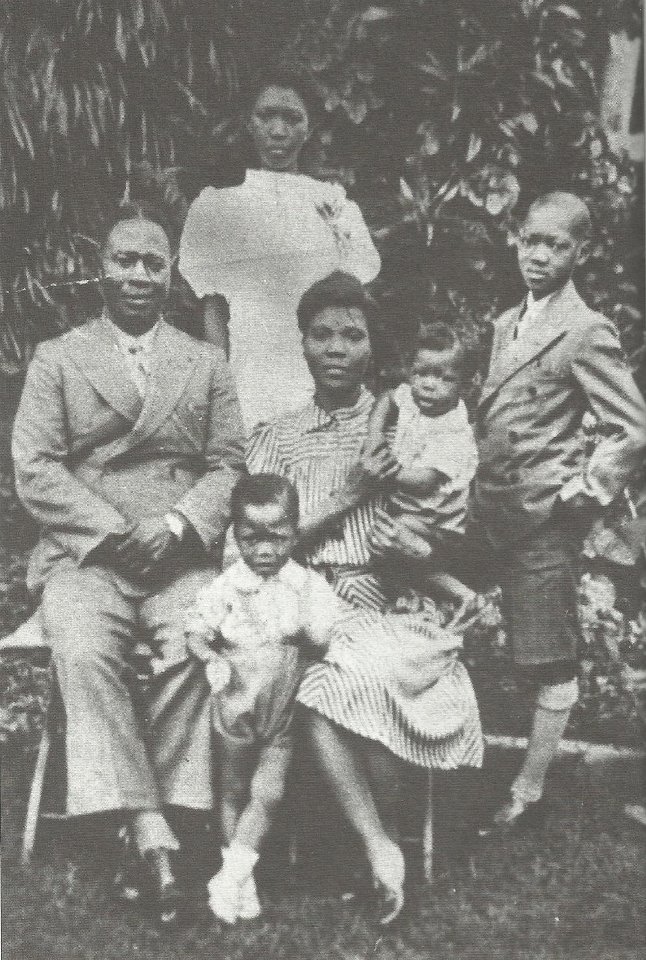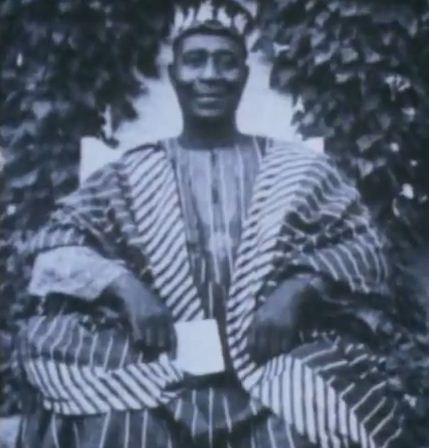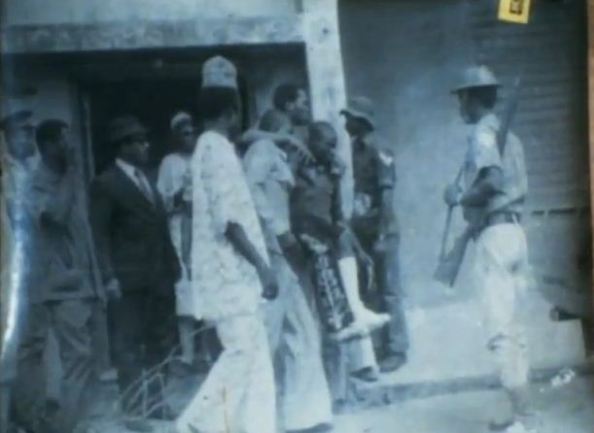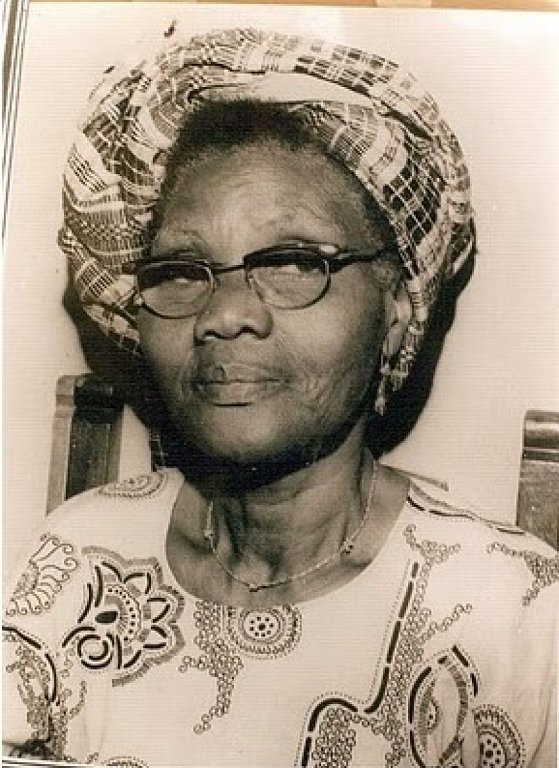
Femi Kuti Takes His Son To His Grandparent's Grave Side In Abeokuta
Femi Kuti took his son, Made to his grandparents - Funmilayo and Israel Oludotun Ransome-Kuti's grave side in Abeokuta to pay their respects. Funmi and Israel Ransome-Kuti would be Made's great grand parents.
 |
| The Ransome-Kuti’s in the ‘40’s L-R Rev Israel, Dolu (standing behind) Fela (standing in front), FRK holding baby Beko and Olikoye. 1940s |
Funmilayo Ransome Kuti (25 October 1900 Abeokuta, Nigeria - 13 April 1978 Lagos, Nigeria), born Francis Abigail Olufunmilayo Thomas to Daniel Olumeyuwa Thomas and Lucretia Phyllis Omoyeni Adeosolu. She was a teacher, political campaigner, and women's rights activist. Ransome-Kuti's political activism led to her being described as the doyen of female rights in Nigeria and was regarded as “The Mother of Africa.” Early on she was a very powerful force advocating for women's right to vote. She was described in 1947, by the West African Pilot as the “Lioness of Lisabi” for her leadership of Egba women on a campaign against arbitrary taxation of women. That struggle led to the abdication of the Egba King Oba Ademola II in 1949 |
 |
In 1949, she led a protest against Native Authorities, especially against the Alake of Egbaland. She presented documents alleging abuse of authority by the Alake, who had been granted right to collect taxes. She also led the successful abolishment of separate tax rates for women.
In 1953, she founded the Federation of Nigerian Women Societies which formed an alliance with the Women's International Democratic Federation. Originally, she was a member of NCNC, but was later expelled by the party after she chose to run as an independent when the party snubbed her as a candidate for a federal house seat. After, her suspension, her political voice was diminished due to the direction of national politics, as both powerful members of the opposition, Awolowo and Adegbenro, had support close by. However, She never let her voice and activism be diminished.
The British colonizers teamed up with their local lackeys to subdue the women. At one protest, the “ORO” stick was brought out – a symbolic artifact of the secretive male cult of the Ogboni – supposedly imbibed with great powers, and the women were instructed to go home before evil spirits overcame them. When the women shrank back in fear, Ransome-Kuti grabbed the stick, waved it around declaring that the women now had the power before taking it with her displaying it prominently in her home. This action gave her a reputation of fearlessness and courage that led 50, 000 women to follow her to the home of Alake of Egbaland (Alake Ademola), the “pseudo-king” of Western Nigeria and a colonial stooge. As the women protested outside the king’s house, they sang in Yoruba:
“Alake, for a long time you have used your penis as a mark of authority that you are our husband. Today we shall reverse the order and use our vagina to play the role of husband.”

Remilekun (Taylor) Ransome Kuti was Fela Anikulapo Kuti’s first wife and mother of his three oldest children, Yeni, Femi and Sola.
With this unified action and song they chased him out of the house, condemning him to exile on threat of castration This.actions resulted in the king’s abdication.
Madam Ransome-Kuti`s’s international career began when together with her husband and their close friend Ladipo Solanke created the infamous West African Student’s Union (WASU). They provided support for West African students studying in London in 1925, WASU promoted nationalist and anti-colonial movements in British West Africa. A list of life long members of WASU reads like a WHO’s WHO of West African leaders and activists: Dr Nnamdi Azikiwe, Chief H O Davies, Aliyi Ekineh, H A Korsah of Gold Coast, Dr Taylor-Cummings of Sierra Leone, the Alake of Abeokuta, Emir of Kano and Asantehene of Ghana. Kwame Nkrumah and Joe Appiah were vice presidents in 1946. WASU was a huge influence on many West African students of the day and played a major part in the independence movements of West African countries. FRK and her husband acted as agents in Nigeria raising funds and distributing pamphlets for the union.
 |
| Mrs Ransome-Kuti pulls crowd |
She also oversaw the successful abolishing of separate tax rates for women. In 1953, she founded the Federation of Nigerian Women Societies which subsequently formed an alliance with the Women's International Democratic Federation, an organisations and movements through which Kuti campaigned for women’s rights to education, employment and political participation.
Funmilayo Ransome Kuti campaigned for women's votes' She was for many years a member of the ruling National Council of Nigeria and the Cameroons party, but was later expelled when she was not elected to a federal parliamentary seat. At the NCNC, she was the treasurer and subsequent president of the Western NCNC women's Association. After her suspension her political voice was diminished due to the direction of national politics, as both of the more powerful members of the opposition, Awolowo and Adegbenro, had support close by. However, she never truly ended her activism. She and Elizabeth Adekogbe provided dynamic leadership for women's rights in the '50s. In fact, in the 1950s, she was one of the few women elected to the house of chiefs. At the time, this was one of her homeland's most influential bodies.
She founded the Egba or Abeokuta Women's Union along with Eniola Soyinka (her sister-in-law and the mother of the Nobel Laureate Wole Soyinka). This organisation is said to have once had a membership of 20,000 women. Among other things, Fumilayo Ransom Kuti organised workshops for illiterate market women. She continued to campaign against taxes and price controls.
 |
| Rev Ransome-Kuti |
During the Cold War and before the independence of her country, Funmilayo Kuti travelled widely and angered the Nigerian as well as British and American Governments by her contacts with the Eastern Bloc. This included her travel to the former USSR, Hungary and China where she met Mao Zedong. In 1956, her passport was not renewed by the government because it was said that "it can be assumed that it is her intention to influence … women with communist ideas and policies." She was also refused a U.S. visa because the American government alleged that she was a communist.
Prior to independence she founded the Commoners Peoples Party in an attempt to challenge the ruling NCNC, ultimately denying them victory in her area. She got 4,665 votes to NCNC's 9,755, thus allowing the opposition Action Group (which had 10,443 votes) to win. She was one of the delegates that negotiated Nigeria's independence with the British government.She bore four sons, one dying shortly after birth, all three who survived carried on her legacy of political activism. Olikote, became an AIDS activist speaking out for the Africans abandoned to the ravages of the disease; Fela, became a musician writing songs inspiring a generation and Beko founded the first Nigerian human rights organisation.

In 1978 she was assassinated by the Nigerian Authorities at the Kalakuta Republic – a commune established by her son Fela, after it was raided by over a thousand Nigerian soldiers acting under orders from General Obasanjo. Kalakuta was often raided by the police and armed forces as was his club “the Shrine”. Obasanjo was angered by Fela’s criticism of the military as “zombies” who intimidated ordinary Nigerians while allowing the corruption and exploitation of communities to go unchecked. On February 18th 1977 Kalakuta Republic was surrounded by a thousand armed soldiers (The present president of Nigeria, Olusegun Obasanjo was then Supreme Commander of the military dictatorship of the day). That day, FRK together with Fela’s brother Bekolari, Fela’s many wives and Fela himself. This raid was a particularly brutal one. The soldiers armed with bayonets and clubs stormed the compound without any warning and began to beat people, destroy property and strip women naked.
| Fela`s mum after the attack |
She bore four sons, one dying shortly after birth, all three who survived carried on her legacy of political activism. Olikote, became an AIDS activist speaking out for the Africans abandoned to the ravages of the disease; Fela, became a musician writing songs inspiring a generation and Beko founded the first Nigerian human rights organisation.

In 1978 she was assassinated by the Nigerian Authorities at the Kalakuta Republic – a commune established by her son Fela, after it was raided by over a thousand Nigerian soldiers acting under orders from General Obasanjo. Kalakuta was often raided by the police and armed forces as was his club “the Shrine”. Obasanjo was angered by Fela’s criticism of the military as “zombies” who intimidated ordinary Nigerians while allowing the corruption and exploitation of communities to go unchecked. On February 18th 1977 Kalakuta Republic was surrounded by a thousand armed soldiers (The present president of Nigeria, Olusegun Obasanjo was then Supreme Commander of the military dictatorship of the day). That day, FRK together with Fela’s brother Bekolari, Fela’s many wives and Fela himself. This raid was a particularly brutal one. The soldiers armed with bayonets and clubs stormed the compound without any warning and began to beat people, destroy property and strip women naked.

FRK, then 77, was pulled by the hair and literally thrown out of the window severely injuring her leg and putting her into shock. The property was then burned down by the soldiers. The raid known as “Kalakuta War” received a large amount of publicity and the government was forced to undertake an investigation. However this came to nothing and the whole incident was blamed on “over zealous unknown soldiers and to Fela”. No one including the Ransome-Kuti family have been compensated for what happened that day. The raid destroyed FRK’s physical and mental health and observers said she had lost her “fighting Spirit”. A year later the family suit for damages from the Kalakuta raid was dismissed as FRK is said to have moaned “why are they doing this to us”. She died in April that year, one of Nigeria’s truely greats and one of its very few RIGHTS activists. for more photos on burnt Kalakuta republic click here: http://babajidesalu.wordpress.com/
Her coffin was sent to the Dodan Barracks in Lagos, General Olusegun Obasanjo’s residence together with a newly written song “Coffin for a Head of State”.
 |
| Tunji Braithwaite (left) Late Mrs Funmilayo Ransome Kuti at the tribunal. Photos: Femi Akintobi |
The irate soldiers shouted : “Disperse, or you’ll be shot! We’ll kill all of you today!”
While the missiles were flying from all directions, Fela’s mother, Mrs. Funmilayo Ransome-Kuti attempted to go out and appeal to the soldiers.
“I drew mama back when she wanted to go out,” said Beko. “I thought she would be mobbed by the soldiers. The pandemonium was so much as the soldiers were virtually pulling the house down.”
Dr. Kuti said that at about 4.00pm, he saw Major Daudu the camp Commandant of Abalti barracks with a few other officers. They dispersed the crowd. They moved among the soldiers, but the soldiers did not stop the aggression. Fela was asked to come down, but he refused.
He said Lieutenant Mike Ikoku was seen near the generator in a Ford lorry outside the building. The generator was then set on fire and the soldiers shouted : “Go through the barbed wire!”
In order to prove that the invading soldiers actually set the generator inside the Ford lorry on fire, Beko stunned the gathering when he showed the tribunal the picture of a soldier carrying a jerry can said to contain liquid suspected to be petrol.
Apart from the picture that was taken at the peak of the kalakuta fracas, the medical doctor also presented two other pictures showing the situation around the area, and some soldiers on the roof of a clinic in Fela’s house on the fateful day.
Asked by Mr. Justice Kalu Anya the time the photographs were taken, Dr. Beko said he would not know, because they were recovered by another person at the heat of the incident. He said he would try to produce negative film of the pictures before the tribunal. The pictures were later admitted as exhibits by the tribunal

The tribunal heard that Warrant Officer Boniface Agor told Dr. Beko Ransome-Kuti : “You call yourself a doctor, and you allow that stupid ass. Don’t you know that we are in power! You said that you will not do FESTAC, and we have done it.”
He also said that he was prevented by the officer from treating some of Fela’s boys aat the Abalti barracks. Answering a question, he said the compound of Kalakuta republic was cemented, hence, there was no question of any stone being thrown from inside it. He also reiterated his earlier statement that Lieutenant Ikoku presided over setting the generator on fire by giving instruction to a junior officer.
In another dimension, he said there was no love lost between Fela and the soldiers .
“One of the causes of mutual antagonism between the soldiers and Fela was the palmphlets printed by the musician over the horse-whip order, connected with traffic regulations in Lagos,” said Beko, adding that “when the soldiers got wind of this, they became Fela’s enemy.
“There are many ways of arresting people, and I was surprised to hear from a witness about Colonel Tarfa being around on the day in question.”
Beko said many patients would have died if he had been operating on them in his clinic on the day of the incident. “In a war zone, clinics and hospitals are respected. Major Agaba Daudu was in my clinic. He was a responsible officer in charge of a camp and here was a clinic, being attacked.”
As the hearing progressed, on the day in question, a sensational drama ensued when a witness suddenly stood up and pointed at a soldier whom she alleged set fire to the generators in a lorry outside Fela’s house on the controversial day.
Her 10 greatest achievements:
[1] First Nigerian woman to drive a car
[2] First Nigerian woman to ride a motorcycle
[3] Co-founder of the Nigerian Union of Students
[4] Co-founder of the Nigerian Union of Teachers
[5] Founded the largest African women's organisation ever with 20,000 members
[6] As the leader of Egba women lead a campaign against arbitrary taxation of women, that led to the abdication of the Egba king Oba Ademola II in 1949
[7] Was Nigeria's first ever representative at a women's international conference in the USSR in 1963
[8] She ran the junior section of Abeokuta Grammar School
[9] Led a concerted campaign to ensure that girls went to school
[10] Brought through a whole hos of Abeokuta kids, including her nephew Wole Soyinka. It is no accident that Abeokuta has produced the greatest number of Yoruba leaders to date.

[1] Do you know that prior to Nigeria's independence, Funmilayo Ransome-Kuti was one of the most widely travelled Nigerian ever?
[2] Unlike most of our people who had only ever been to the UK and the US, she had actually been to China and Russia too
[3] She actually met with Mao Tse Tung in 1956
[4] After that, the British refused to renew her passport because it was said "It can be assumed that it is her intention to influence women with communist ideas and policies."
[5] She was also refused visa into the US because the American Government alleged she was a communist
[6] Prior to independence she founded the Commoners Peoples Party challenging the ruling NCNC, denying them victory in her area. She got 4,665 votes to NCNC's 9,755 thus allowing the opposition, Action Group 10,443 votes to win
[7] She was actually denied an NCNC ticket because she was deemed as too radical. Shame on the NCNC or she would have been our first federal female MP
[8] She was one of the delegates that negotiated Nigerian independence with the British government in 1957/58
[9] In 1953, she founded the Federation of Nigerian Women Societies which formed an alliance with the Women's International Democratic Federation
[10] While in the NCNC, she was the treasurer and then president of the Western NCNC women's Association

No comments:
Post a Comment